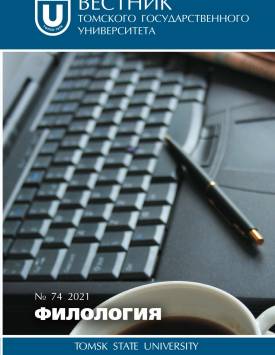Everyday Media Discourse as an Interpretive Discourse (Based on Interpretive Utterances of Internet Speech)
The object of the research is everyday media discourse organised around media events. It is considered to be interpretive discourse. The article develops the idea of T. van Dijk, according to which interpretive discourse actualises the mental model of the event. The study was performed in the areas of interpretation linguistics and discourse study. Everyday media discourse is considered to be a discourse whose subject is the narratee of the source-discourse forming interpretive activity regarding the communicative event that organises it. The material for the analysis was statements in the form of Internet comments to the media event “The Crash of the Ukrainian Boeing in Tehran”. The total number of the analysed interpretive statements is 158. To describe everyday media discourse, the terminology of discourse study characterising interpretive discourses is used. Everyday media discourse is considered as the discourse mode and the discourse dictum. The modus of everyday media discourse displays itself in strategies and types of interpretation of the media event. There are the following types of media events' everyday interpretation strategies: identified by the degree of evaluation of the truth/falsity of the media event and identified by the degree of intensity of modus meanings in the interpretation. Among the former, there is the strategy of language skepticism and the strategy of language trust. Rational and emotional strategies are identified by the degree of intensity of modus meanings in the interpretation. Rhetorically- and dialogically-oriented types of interpretation of media events are described. The dictum of everyday media discourse can be traced in the model of interpretation of media events. The model of interpretation is understood as a process of interpretive functioning of the media event in the discourse of ordinary native speakers. The propositional model of everyday interpretation of the media event based on empirical material assuming the actualisation of various actants of the media event proposition is described. The research results are significant for the media industry (medialogy) for they allow predicting the variants of the interpretive functioning of the media event in the everyday language consciousness and using it as a basis to correct the ways of presenting media events in the media.
Keywords
media event,
everyday media discourse,
discourse mode,
discourse dictumAuthors
| Dudareva Yana A. | Kemerovo State University | dudareva-yana@yandex.ru |
| Shpilnaya Nadezhda N. | Altai State Pedagogical University | venata85@mail.ru |
Всего: 2
References
Болдырев Н.Н. Интерпретирующая функция языка // Вестник Челябинского государственного университета. 2011. № 33 (248). С. 11-16. URL: https://cyberleninka.ru/article/n/interpretiruyuschaya-funktsiya-yazyka (дата обращения: 28.02.2020).
Дейк Т.А. ван. Дискурс и знание. URL: https://cyberleninka.ru/article/n/diskurs-i-znanie (дата обращения: 28.02.2020).
Чернышова Т.В. Тексты СМИ в ментально-языковом пространстве современной России : дис.. д-ра филол. наук. Барнаул, 2005. 577 с.
Бирюкова Н.С. Восприятие студентами прецедентных феноменов, используемых в современной массовой коммуникации : дис. канд. филол. наук. Екатеринбург, 2005. 196 с.
Пикулева Ю. Б. Прецедентный культурный знак в современной телевизионной рекламе: лингвокультурологический анализ : автореф. дис.. канд. филол. наук. Екатеринбург, 2003. 23 c.
Постнова Т.Е. «Страсти по мехам» и «Кошмар на улице ВАЗов» // Русская речь. 2001. № 6. С. 69-72.
Борухов Б.Л. Речь как инструмент интерпретации действительности (теоретические аспекты) : автореф. дис.. канд. филол. наук. Саратов, 1989. 17 с.
Батаева Е.В. Симвология и герменевтика медиа-образа. URL: https://cyberleninka.ru/article/n/simvolologiya-i-germenevtika-media-obraza (дата обращения: 28.02.2020).
Мохирева С.В. Медиадискурс как реализация интерпретационного потенциала события (на материале публикаций в русскоязычных СМИ) : автореф. дис. канд. филол. наук. Кемерово, 2017. 24 с.
Голев Н.Д., Ким Л.Г. Обыденные политические интернет-комментарии как проявление вариативности интерпретации (оппозиции «эксплицитное - имплицитное», «проявленное - ожидаемое») // Имплицитные и эксплицитные стратегии в восточноевропейском политическом дискурсе : материалы российской секции междунар. конф. «Ain't misbehavin' Implisit and explicit strategiesin Eastern European political discourse» / под ред. А. П. Чудинова, Э. В. Будаева. Екатеринбург ; Цюрих, 2014. С. 47-70.
Мельник Н. В., Савельева И. В. Лингвоперсонологические стратегии восприятия текста (на материале интернет-комментариев к политическим статьям) // Вестник Кемеровского государственного университета. 2017. № 4. С. 197-204.
Шпильная Н. Н. Стратегии и тактики коммуникативного поведения языковой личности в обыденной политической коммуникации // Политическая лингвистика. 2017. № 5. С. 222-228.
Абросимова Е. А., Кравченко Ю. Д. Читательский комментарий как феномен интерпретации медиатекста (на материале интернет-комментариев и данных эксперимента) // Медиаскоп. 2017. Вып. 2. URL: http://www.mediascope.ru/2317 (дата обращения: 28.02.2020).
Ергалиева С.Ж. Лингвоперсонологические стратегии и тактики комментирования политических текстов в виртуальном пространстве. URL: https://cyberleninka.ru/article/n/lingvopersonologicheskie-strategii-i-taktiki-kommentirovaniya-politicheskih-tekstov-v-virtualnom-prostranstve (дата обращения: 12.02.2020).
Тубалова И. В. Полифонический текст в устных личностно-ориентированных дискурсах : автореф. дис.. д-ра филол. наук. Томск, 2015. 43 с.
Карпоян С.М. Эпистемическая модальность в интернет-комментарии : дис. канд. филол. наук. Ростов н/Д, 2014. 193 с.
Стексова Т. И. Объекты комментариев в интерактивной газетной статье // Вестник НГУ. Серия: История, филология. 2013. Т. 12, вып. 10: Журналистика. URL: https://cyberleninka.ru/article/n/obekty-kommentariev-v-interaktivnoy-gazetnoy-statie (дата обращения: 10.02.2020).
Ушаков Д.В. Когнитивная система и развитие // Когнитивные исследования: Проблема развития : сб. науч. тр. М., 2009. Вып. 3. С. 5-14.
Ким Л.Г. Вариативно-интерпретационное функционирование текста. Томск, 2009. 312 с.
Мельников Г.П. Внутренняя форма русского языка ключ к пониманию его особенностей на всех уровнях. URL: http://philologos.narod.ru/melnikov/melnikov-vf.htm (дата обращения: 20.02.2020).

